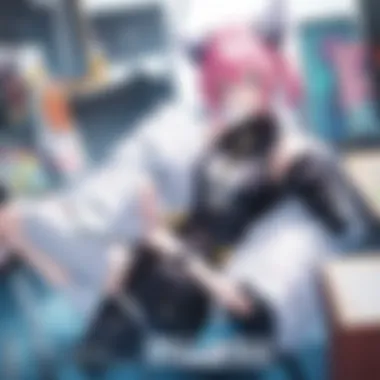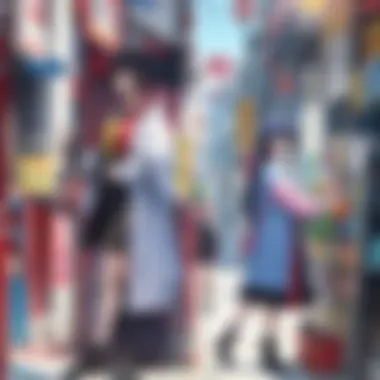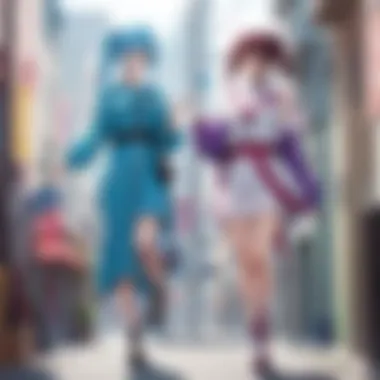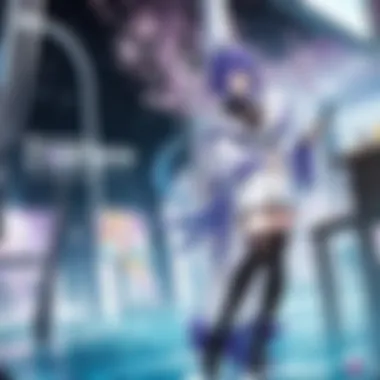Funimation Anime List 2020: Key Titles Explored


Intro
In the rapidly evolving world of anime, 2020 marked a distinctive year on the Funimation platform. With a wide array of titles released, from mainstream hits to niche experiments, audiences had a bounty of content to indulge in. This article serves as an insightful exploration of the notable anime offerings available on Funimation in that year.
By dissecting key titles, their themes, and the overall reception by fans, the analysis provides depth to the understanding of these works. The focus remains on how these series resonate within the anime landscape, catering to diverse preferences that guide viewers' choices.
Featured Series or Manga
Overview of the Series
A variety of anime series caught attention throughout 2020. Among these, titles like My Hero Academia season 4 stood out, continuing its success with dynamic storytelling and character development. Similarly, Re:Zero - Starting Life in Another World received acclaim for its intricate plot and rich world-building, captivating new and returning viewers alike. Other titles also emerged, each contributing to the overall tapestry of themes and ideas present during the year.
Key Characters and Development
Character exploration is central to many of the series. For instance, in My Hero Academia, viewers followed the journey of Izuku Midoriya and his peers as they navigated their own growth against formidable adversaries. In Re:Zero, Subaru Natsuki’s complex journey through despair and redemption provided a riveting look at resilience.
Character Analysis
Major Characters
Characters in these series exemplify different arcs and perspectives. Notably, heroes and their challenges illuminate important aspects of personal and social struggles. In My Hero Academia, All Might’s legacy and mentorship of Midoriya highlight themes of courage and responsibility. In contrast, Re:Zero delves into deeper psychological issues, showcasing Subaru’s transformation amidst his harrowing experiences.
Character Arcs and Growth
The growth of characters is critical to engaging narratives. In My Hero Academia, Midoriya's progression from a quirkless aspiring hero to a formidable fighter encapsulates the essence of perseverance. On the other hand, Subaru's fluctuating emotional state and his eventual acceptance of his limitations provide audiences a visceral understanding of human fragility.
Thematic Exploration
Main Themes and Messages
The anime titles from 2020 explored profound themes. Concepts of identity, sacrifice, and the battle between good and evil were prevalent. My Hero Academia often reflects on what it means to be a hero, while Re:Zero confronts the psychological implications of choice and consequence. Each series, through its unique lens, invites viewers to ponder significant existential questions.
Cultural Context and Influences
Understanding the cultural backdrop is essential in appreciating these narratives. Anime serves as a mirror to societal values and struggles. The melding of traditional tropes with modern narratives in these series illustrates how contemporary issues influence storytelling. The work of creators reflects a blend of hope and critique, resonating with viewers across the globe and fostering a broad discussion surrounding cultural influences in anime.
"Anime not only entertains but also serves as a means of cultural expression, allowing for a dialogue between the narrative and its societal context."
With a thoughtful examination of Funimation's offerings in 2020, this article aims to illuminate the depth of the medium, encouraging both new and seasoned fans to engage deeply with the art form.
Prolusion to Funimation's Anime Offerings
Anime has carved a unique niche in global entertainment, reflecting diverse cultures and narratives that resonate with audiences worldwide. Funimation, a prominent distributor of anime, has played a crucial role in providing access to a vast range of titles. This overview will outline not only Funimation's significance in the anime scene but also the themes that emerge from its offerings.
Overview of Funimation
Funimation was founded in 1994 and has since evolved into a key player in the anime industry. It specializes in the localization and distribution of anime, allowing for increased accessibility to Western audiences. With a library that spans numerous genres, Funimation offers both dubbed and subtitled versions of popular series. This flexibility caters to a broad spectrum of anime fans, from newcomers to long-term enthusiasts.
The platform is well-known for series such as "Dragon Ball Z" and "My Hero Academia," and boasts partnerships with major studios, which helps in acquiring anime soon after their Japanese release.
Funimation has also embraced streaming technology, adapting to changing viewer habits. Its service not only focuses on the latest titles but also maintains a catalog of classic series that continue to gather interest. In 2020, Funimation’s offerings were vital in keeping the anime culture alive during periods of isolation, proving that entertainment can provide solace in challenging times.
Importance of Anime in Popular Culture


The significance of anime extends beyond the realm of entertainment. As a medium, it features innovative storytelling, complex characters, and distinctive art styles. In recent decades, anime has gained tremendous popularity worldwide, often crossing cultural boundaries.
Anime presents a platform for exploring intricate themes, such as personal growth, societal issues, and emotional struggles. Its influence can be seen in various forms of media, including films, video games, and even fashion. The impact of anime on popular culture is undeniable, shaping the content that resonates with audiences and informing trends across various sectors.
Moreover, conventions, online forums, and social media platforms have fostered community among fans. This convergence of interests commonly leads to discussions that reinforce anime's role in shaping personal and cultural identities. Thus, Funimation plays not only a role in the distribution of anime but also as a contributor to the broader cultural phenomena surrounding this art form.
"Anime's storytelling ability fosters deeper connections with audiences, promoting a culture of empathy and understanding."
In summary, recognizing Funimation's contributions facilitates a deeper appreciation for the anime that continues to evolve and captivate viewers. This foundation sets the stage for a closer examination of the key genres and notable titles available on the platform in 2020.
Key Anime Genres on Funimation
Anime genres play a vital role in shaping the viewer's experience and expectations. Funimation offers a rich selection of anime across various genres, catering to a wide range of tastes. Understanding these genres can enhance the viewing experience by providing context to the narratives, themes, and character developments present in the titles on the platform. Distinguishing between genres helps viewers find anime that resonates with them personally, whether they seek action, romance, or complex storytelling. Moreover, each genre carries unique characteristics that contribute to the overall diversity of the anime landscape.
Shonen
Shonen is one of the most recognized genres in anime. It primarily targets a young male audience, typically featuring action-packed narratives, camaraderie, and often, a journey towards self-improvement. Many popular titles fall into this genre, like "My Hero Academia" and "Attack on Titan." Shonen anime often include themes of friendship, perseverance, and competition, making them appealing to a broad audience. The vibrant visuals and fast-paced storytelling keep viewers engaged, often culminating in intense battles and personal growth of the central characters.
Shojo
Shojo anime is generally aimed at a younger female demographic. These titles focus on character development, emotional storytelling, and relationships. Common themes include romance, friendship, and personal discovery, which contribute to their popularity among the target audience. Series such as "Fruits Basket" and "Your Lie in April" exemplify this genre, often presenting relatable characters and intricate plots that reflect the complexities of youth. The art style in Shojo anime is typically softer, emphasizing expressions and emotions.
Seinen
Seinen anime targets older male viewers, exploring more mature and complex themes. This genre can include intense action but often delves into psychological and existential matters. Titles such as "Death Note" and "Berserk" showcase intricate plots and character trajectories that resonate with adult audiences. The storytelling might employ layers of complexity, challenging viewers to engage with the material on deeper levels. Themes of morality, society, and the human condition are prevalent.
Isekai
Isekai, meaning "another world," is a genre that gained significant traction in recent years. It involves characters being transported to a different world, often leading to adventures and challenges. This genre allows for unique world-building and exploration of fantasy elements. Titles like "Re:Zero" and "Sword Art Online" have captivated audiences with their blend of reality and fantasy, creating compelling scenarios that engage viewers. Isekai often explores themes of identity, morality, and the consequences of power, making it a favorite for those who enjoy high-stakes storytelling.
Notable Titles in
The Notable Titles section is crucial for understanding Funimation's specialized offerings in 2020. It showcases the diversity and richness of anime that Funimation provided. By examining these titles, readers gain insight into the direction and trends within anime culture for that year. Titles selected can reveal the types of stories and themes that resonate with audiences. It helps not only in recognizing popular choices but also in understanding the broader cultural impact of these works.
Top Picks from Shonen Genre
Title One
My Hero Academia: Season 4 stood out for its compelling storytelling and character development. It builds upon the foundation laid in the earlier seasons by exploring deeper conflicts and emotions. The distinctive aspect of this season is its focus on both heroism and the moral ambiguities faced by its characters. This title is a great choice for readers interested in how moral dilemmas are presented in modern shonen narratives.
Moreover, the unique feature of My Hero Academia is its extensive universe filled with unique quirks. This aspect creates an extensive array of scenarios suitable for dramatic conflicts and character exploration. The season has both advantages in viewer engagement and some critiques for pacing in certain episodes.
Title Two
Demon Slayer: Kimetsu no Yaiba gained massive acclaim for its animation quality and emotional weight. The narrative involves a young boy, Tanjiro, battling demons to save his sister. What makes this title beneficial for this discussion is how it combines traditional shonen elements with a touching personal story. It captures the readers' attention through its themes of family and sacrifice.
A unique attribute of Demon Slayer is its stunning visual presentation, thanks to Ufotable's animation prowess. This has distinct advantages for engaging viewers who also appreciate art in anime. However, some viewers noted a pacing issue in the storyline, particularly in the earlier episodes.
Title Three
Jujutsu Kaisen emerged as a fresh take on the supernatural shonen genre. Its premise revolves around curses and sorcery, which sets it apart from conventional narratives. The character dynamics and humor while facing darker themes make it a significant title for this article. It showcases the blend of action and character-driven plotlines in contemporary shonen works.
The distinctiveness of Jujutsu Kaisen lies in its ability to balance serious themes with lighthearted moments effectively. This duality can attract various viewers looking for both action and character depth. However, some viewers found that the plot had some predictability in its progression.
Highlighted Shojo Series


Title Four
Fruits Basket (2019) is a reinterpretation of the classic series, focusing on themes of acceptance and healing. The narrative is largely about a young girl who becomes entangled with a family cursed to transform into animals of the Chinese Zodiac. This title is beneficial as it illustrates emotional struggles and personal growth through relationships.
The unique aspect of Fruits Basket is its ability to combine elements of romance, drama, and supernatural themes. This blend makes it accessible to a broad audience. However, some critiques mentioned that the pacing could feel slow at certain points throughout the series.
Title Five
My Next Life as a Villainess: All Routes Lead to Doom! offers a humorous approach to the isekai genre. The story revolves around a girl who is reborn as the antagonist in an otome game. This title is appealing because of its clever subversion of genre tropes. It resonates with those who enjoy lighthearted narratives with strategic thinking.
The engaging feature of this anime is its comedic take on character interactions. It provides a balance of humor and relatability, making it enjoyable for many viewers. However, some may find the narrative's lightness less appealing if they prefer more serious storytelling.
Impactful Seinen Selection
Title Six
Beastars gained attention for its unique anthropomorphic characters and social commentary. The narrative reflects themes of instincts versus society norms through the lives of carnivore and herbivore students. This title stands out in this section for its addressing of complex social issues.
The strength of Beastars lies in its intricate character design and philosophical themes. It provides a layered storytelling experience that appeals to adult audiences. However, the animation style may not resonate with everyone.
Title Seven
The God of High School offers a fresh look at martial arts and competition among high schoolers. It emphasizes action and has a vibrant animation style. This makes it a significant mention as it showcases dynamic fight scenes aligned with current trends.
One key element of The God of High School is its intense pacing that keeps viewers engaged. Meanwhile, some critics argue that the plot development lacks depth beyond the action elements, which may detract from the overall experience for some viewers.
Isekai Favorites
Title Eight
Re:Zero - Starting Life in Another World (Season 2) explores darker themes within the isekai genre. It deals with psychological trauma and the complexities of time travel. This season is particularly important because it expands on the emotional consequences of the protagonist's abilities.
The show's unique feature is its narrative that challenges typical tropes found in lighter isekai series. It allows for an exploration of character motivations and growth. The disadvantage may be its complex plot structure that could be confusing for some viewers.
Title Nine
That Time I Got Reincarnated as a Slime: Season 2 mixes humor and adventure with a unique protagonist. The story revolves around a slime who gains power and friends in a fantasy world. This series is a notable mention for its ability to blend light-heartedness with world-building.
The key characteristic is its creativity in storytelling that appeals to both younger and older audiences. The animation and character designs are appealing, although some critiques mention the slower pacing in certain plot arcs.
Analysis of Themes in Titles
Understanding the themes prevalent in the anime titles released in 2020 on Funimation adds considerable depth to the viewing experience. Themes serve as the underlying threads that bind stories together and reflect the intricacies of human experience. By dissecting these themes, we can appreciate the artistry behind the narratives and understand the cultural context influencing these works.
In the subsequent sections, we will explore three significant themes found in 2020's anime offerings: Coming-of-Age Narratives, Exploration of Family Dynamics, and Cultural Reflections in Anime. Each of these themes provides insights into the motivations of characters and the issues they navigate, resonating with viewers across different backgrounds.
Coming-of-Age Narratives
Coming-of-age narratives form a crucial component of many anime series, especially those aimed at a younger audience. These stories focus on the growth and emotional development of characters as they navigate the challenges of adolescence. In 2020, various titles emphasized this theme, illustrating how characters grow into their identities amidst turmoil.
For instance, series like My Hero Academia continue to highlight the journey of young heroes learning about their powers and responsibilities. The struggles they face not only provide entertainment but also encourage viewers to reflect on their own coming-of-age experiences.
The importance of this theme lies not just in the character arcs, but also in its ability to connect with the audience. Viewers often see themselves in these narratives, feeling a sense of belonging or understanding as they witness characters confronting their fears and aspirations.
Exploration of Family Dynamics


Another prominent theme within 2020's anime is the exploration of family dynamics. Family serves as a fundamental unit in society, influencing individual development and emotional well-being. The anime titles for that year examined various family structures, relationships, and conflicts.
For example, Fruits Basket offers profound insights into how family can simultaneously serve as a source of comfort and turmoil. The series deeply engages viewers as it portrays the complexities of familial relationships, making them relatable and compelling.
The exploration of family dynamics in these shows allows for broader conversations about relationships and societal expectations. It fosters a dialogue around the importance of understanding and accepting one another, which is essential in both the fictional realm and real life.
Cultural Reflections in Anime
Anime often serves as a mirror to society, reflecting cultural values and societal issues. In 2020, many titles tackled regional and global issues, presenting stories rich in cultural context. Titles like Dorohedoro highlight elements of urban life, social struggle, and the fight for identity within a fantastical setting.
The cultural reflections embedded in these narratives encourage viewers to engage with complex topics, such as class disparity and community resilience. As a result, anime not only entertains but also provides a platform for examining various sociopolitical landscapes.
"Anime transcends entertainment; it invites viewers into a nuanced discussion of their world and its many facets."
In summary, the thematic elements observed in Funimation's 2020 anime offerings are essential for appreciating the art form. By engaging with these themes—coming-of-age narratives, family dynamics, and cultural reflections—viewers not only delve deeper into the stories but also foster greater awareness of their significance within the broader cultural and social context.
Audience Reception and Critiques
Understanding the audience's reception and critiques is crucial in assessing the impact of Funimation's anime offerings in 2020. For creators and distributors, knowing how viewers respond to different titles helps in determining what resonates in the current landscape. It also reflects the cultural significance these works hold for their audience.
Analyzing audience reception not only clarifies trends within the anime community but also provides insight into the evolving tastes and preferences of viewers. With a variety of genres available, each with its unique attributes, audience feedback becomes a valuable resource for both fans and the industry. Critiques often highlight strengths and weaknesses of individual titles, guiding potential viewers in their choices.
Viewership Statistics and Trends
Viewership statistics shed light on the popularity of various anime titles on Funimation in 2020. Streaming platforms allow for real-time data collection, providing insights into user engagement and demographic preferences. Popular titles generally see higher viewership numbers, but niche shows can also maintain a strong following.
Some trends noted in 2020 include:
- Rise of Isekai titles: Series like "Re:Zero" and "Sword Art Online" captured significant attention, illustrating the genre's appeal.
- Growing interest in diverse narratives: An increase in stories that explore complex themes drew in viewers looking for depth.
- Engagement on social media platforms: Communities on platforms like Reddit and Facebook discussed and shared their favorite titles extensively, influencing viewership.
These statistics not only highlight what managed to capture viewer attention but also reflect on how trends shift.
Critical Reviews and Feedback
Critical reviews and feedback are necessary to comprehend the duality of audience reception. While some titles gain popularity based on viewership alone, critics evaluate the substance behind these shows. Their insights take into account animation quality, plot coherence, character development, and thematic depth.
In 2020, several series stood out and received commendations:
- "Dorohedoro": Critics praised its unique art style and gripping story arc, presenting a dark yet inventive take on the genre.
- "My Hero Academia" (Season 4): It continued to win the hearts of fans with its growth in character dynamics and moral complexities.
Feedback, both positive and negative, allows prospective viewers to navigate Funimation’s vast catalog effectively. It emphasizes the importance of informed viewing, where audiences can appreciate the nuances of each title through the lens of critique. As such, understanding audience reception and critiques becomes more than a metrics game; it represents a dialogue between creators and viewers that enriches the anime experience.
Closure
The conclusion of this article serves a crucial purpose. It synthesizes the insights gathered from analyzing Funimation's anime offerings in 2020. Understanding the landscape of anime is essential, especially considering how trends evolve. As audiences become more discerning, the content provided by platforms like Funimation holds significant weight in shaping viewer preferences
The Future of Funimation's Anime Offerings
Looking ahead, Funimation faces a landscape that changes rapidly. Audiences demand diverse genres and appealing narratives. In 2020, Funimation expanded its library and many of its titles reflect various cultural themes. Future offerings should aim for inclusivity while maintaining quality. Engagement with users can directly affect what's produced next. Online communities are vocal about their preferences, making listener feedback invaluable.
Bold moves can expect rich rewards. Integrating new technologies, such as augmented reality or interactive storylines, may redefine how stories are told in anime. As streaming continues to dominate, Funimation has an opportunity to cement its role as a progressive platform.
Final Thoughts on the Anime Landscape
2020 has been an illustrative year for anime. The crisis around the world amplified online resources, making accessibility paramount. Popular titles from Funimation helped keep audiences engaged at home. Series offered more than mere entertainment; they provided comfort and a sense of community during uncertain times.
The interaction of traditional storytelling and modern issues is striking. Themes found in the anime reflect societal sentiments, showing an awareness that resonates deeply. Collectively, these narratives enhance the broader cultural discourse. The success of various titles could shape trends for future productions, directing more attention toward unique stories. Seeing how Funimation adapts to these shifts will be fascinating.
"As the demand continues to rise, the anime industry must evolve, offering rich content reflective of diverse perspectives where story and audience shape one another."
In summary, Funimation's anime offerings in 2020 illustrate a vibrant connection between creators and audiences. Understanding this dynamic forms a better context for what lies ahead in this constantly evolving medium.



